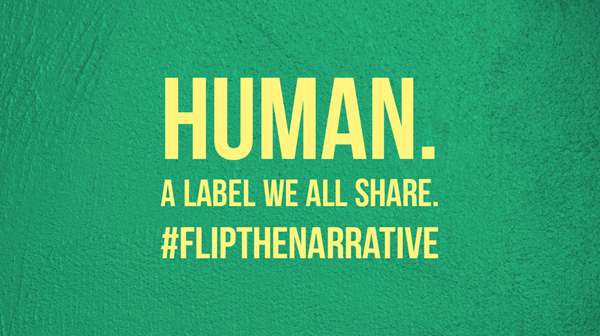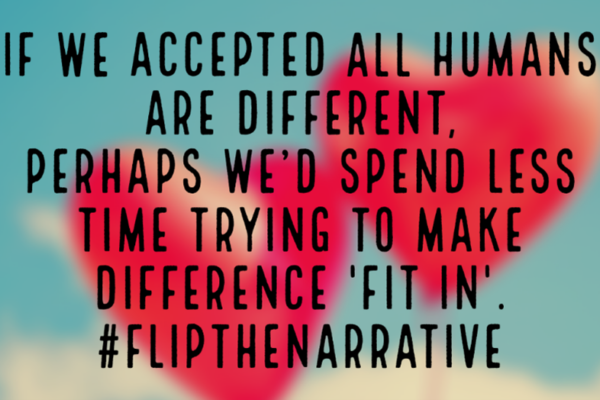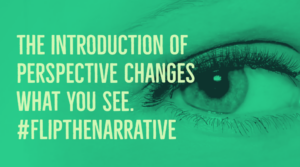
By Elly Chapple
There’s never been a more relevant time and space to change the way we talk about one another and share the space with one another – as humans. The past two years reshaped many lives and people have found strength in one another, during times that shook the very foundations of every life as it was known.
Many however, have lived in this grey, uncertain space for a long time. Those we consign to the shadows, still, those we deem so different to us. We have experienced some of the restrictions that people with different abilities or needs have lived with most of their lives, in what feels often like second place to the rest of society. Was it really meant to be like that though? Because it contradicts the very truth of who we are.
Collectively we have a multitude of differences, and experiences, but we have one thing in common overriding everything – we are all Human.

When we think about our history and our culture, humans always have been, always will be and need to be different. Our diversity is inherent, no human is the same as the next. We know this, but we still struggle to accept that fundamental truth. That’s the reason our history is so important, be it recent or longer term, to inform who we are now, and why and what we need to become for the future. It’s a reminder that we have come a long way, but we have so much further to go too.
Museums and cultural spaces house the essence of our history, share messages through exhibitions, the fabric of the building and the atmosphere within. When we think about who can visit a museum, we should be able to confidently say – anyone can, because it isn’t an exclusive space for ‘a type of human’, it is for every human, and everyone has a right to know about their own history and culture. Like many spaces we inhabit, it doesn’t sound complicated, but we consistently make it so because we find accessibility difficult, or we forgot that our natural diversity means we have more than spoken languages to accommodate, and differing ways of being to make room for. It’s often construed as a huge issue to overcome, but the issue is of our own making and one we have a responsibility to address and find solutions for.
We owe it to our future generations to get this right now, to be wholly accepting of our innate diversity. Will our children thank us for turning from what they can see clearly, and speak about more freely than we ever did?

Learning about our history and different cultures is key to us gaining different perspectives about our world and the space we all share. It creates a sense of connection to a shared past, and the lessons we learned along the way, and it opens our eyes to the way in which other people see or experience the world. It’s necessary that we can all experience these spaces so that negative or biased stereotypes are a thing of the past, rather than the way of the future. Recognition of the differences we have and understanding more about those differences only seeks to empower us to be able to acknowledge the differing ways of ‘human being’.
To truly share in the history and culture we are all a part of, we must ensure that everyone can have the opportunity to visit museums, and all other spaces. That means we must also make sure they are accessible, in terms of mobility, language and environmental design. When we design spaces for every human, they work for every human. It isn’t complicated, but it is a commitment to making sure we are including all human experience, because that is what history should share and represent.

To do this truly, and with a real commitment we first need to reflect on any assumptions we make about what people can or can’t understand, what matters to them and how they would like to experience something. That’s for individuals to decide and have input into.
Including people in the human design of spaces is vital to understand what works or doesn’t and to be able to listen to their ideas and engage in differing perspectives.
That is how we grow and change to encompass a wider view than an assumed ‘norm’. It does mean being brave and showing up right next to people who have less of a space than others in life, standing next to them in the ring – forget coaching from the sidelines. If you’re willing to walk with people and really work with them, amazing things start to take shape and without realizing it, your perspective starts to widen. You free yourself from a ‘lack’ perspective to one of really embracing human difference.
So why do we need to flipthenarrative? Because it’s vital to our shared unity as humans, vital to our evolving spaces, places, and lives. Vital in the face of the past two years and the future ahead that requires us to finally address those outdated narratives and place them into history, so we can keep evolving and developing our shared humanity, ways of being and human difference.
Bio: Elly graduated with honours in Human Resource Management and the Psychology of Human Communication. She has always been fascinated with human communication and behaviour, both verbal and non-verbal. She spent her early career working in businesses, managing and developing strategy for solutions focused approaches and building and maintaining relationships with clients.
Elly has a passion and interest in equality and inclusion for all, and her drive is to ensure that everyone has a seat at the table. In 2014 when her eldest daughter lost her vision through misunderstanding of her disability, Elly sold her business to come home and begin another journey. She shared their story at TEDx Norwich to #flipthenarrative.
Elly’s daughter taught her that communication takes a working ‘with’ rather than ‘doing to’ approach and with her training in Deafblindness across the years, she has focused her efforts on sharing the understanding of how successful communication can be, if we retain the focus on relationships first and foremost.


